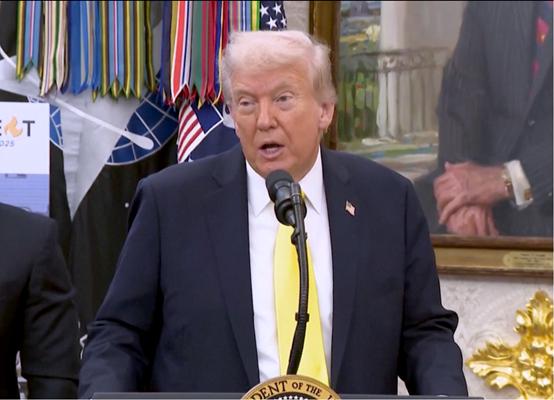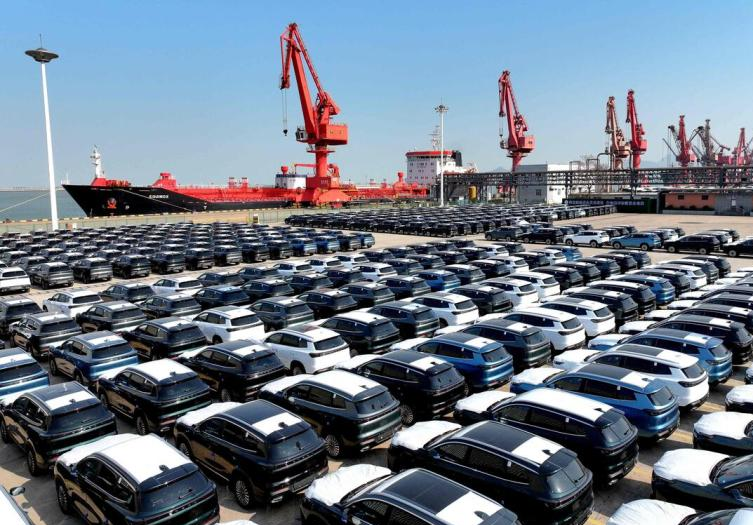
On October 15, 2025, U.S. President Trump dropped a "political bombshell" at a White House press conference—he claimed that Indian Prime Minister Modi had personally assured him that India would cease purchasing oil from Russia. Trump described this statement as a "significant step," even using terms like "friend" and "love" to emphasize the intimacy of U.S.-India relations. However, the Indian government has yet to issue a formal response, and this sudden diplomatic declaration has rapidly evolved into an international controversy involving energy security, geopolitical maneuvering, and the credibility of major powers.
(I) Trump's "Declaration of Victory": A Diplomatic Breakthrough Under Tariff Pressure?
Trump's statement was not an isolated incident. Since July 2025, the United States has been exerting sustained pressure on India, imposing a 25% tariff on Indian exports to the U.S. under the pretext of "supporting Russia's war economy," driving the total U.S.-India tariff rate to 50%. Trump even publicly ridiculed the Indian economy as a "dying economy" and threatened to impose a 100% tariff on all countries continuing to purchase Russian oil if Russia failed to reach a peace agreement with Ukraine within a specified timeframe. Against this backdrop, Trump's claim that Modi had made a commitment to halt purchases was interpreted by the outside world as a "phased victory" for his pressure strategy against India.
From an economic perspective, Trump's tariff tool indeed struck at India's vulnerabilities. As the world's third-largest oil importer, India's daily demand exceeds 5 million barrels, with Russian oil once accounting for up to one-third of its imports. The U.S.'s hefty tariffs not only threaten Indian exports to the U.S. but could also trigger global oil price fluctuations, impacting India's inflation and livelihoods. In his statement, Trump emphasized that "Modi needs time" while hinting that "the process will end soon," seemingly leaving room for India to adjust while showcasing the effectiveness of his "art of the deal" to the domestic audience.
(II) India's Silence: Strategic Ambiguity or Diplomatic Dilemma?
In stark contrast to Trump's high-profile announcement, India has remained silent. As of now, the Indian Embassy in Washington has not responded to media inquiries, and the Indian Ministry of Petroleum and Natural Gas, along with the three major state-owned oil refining companies (Indian Oil Corporation, Bharat Petroleum Corporation, and Hindustan Petroleum Corporation), have all declined to comment. This "neither confirm nor deny" attitude exposes India's strategic dilemma between the U.S. and Russia.
On the one hand, India's energy cooperation with Russia has deep historical roots. Russia is not only India's largest oil supplier but also a core partner for its weapons imports. Despite the shrinking discount on Russian oil from 10perbarrelto2.5–4 per barrel, India still relies on Russian oil to maintain its energy security. On the other hand, India's relationship with the United States cannot be ignored. With U.S.-India trade reaching $87 billion in 2025, India risks greater economic losses if it fully capitulates to U.S. pressure.
The domestic reaction in India has been intense. Opposition leader Rahul Gandhi publicly mocked Modi, saying he had "licked the U.S.'s boots and gained nothing," while public opinion has questioned whether Trump's statement is a "political lie." Indian netizens generally believe that halting Russian oil purchases would lead to soaring energy costs, exacerbated inflation, and even undermine Modi's approval ratings. Under such internal and external pressures, India's silence may represent a form of "strategic ambiguity"—avoiding direct offense to the U.S. while reserving room for future policy adjustments.
(III) The Deeper Logic of Geopolitical Maneuvering: A Clash Between the BRICS Bloc and the Dollar System
Trump's statement goes far beyond a simple bilateral trade issue; it lies at the heart of a deeper clash between the BRICS countries and the U.S. dollar system. Trump has openly stated that the BRICS bloc was "born to destroy the dollar" and threatened to take action against countries continuing to purchase Russian oil. This pressure on India is, in essence, an attempt to strike at Russia's economic lifeline and weaken energy cooperation within the BRICS bloc.
However, India's choice is not isolated. China, Europe, and other economies are also importing Russian oil. If the U.S. singles out India for punishment, it could risk fractures within its alliance system. Additionally, if India shifts to Middle Eastern or African suppliers, it may alleviate short-term pressures, but in the long run, the "de-Russification" of the global energy market could drive up oil prices, backfiring on the U.S. economy. Former Indian diplomat Jitendra Nath Misra pointed out that Trump's tough tactics "may lack diplomatic decorum, but they pursue diplomatic results," aiming to reshape the global energy trade landscape through pressure.
(IV) The Dual Challenges of Trust Crisis and Policy Adjustment
At present, the core contradiction of this incident lies in the "authenticity of the commitment" and the "feasibility of implementation." If Modi did indeed make a commitment to halt purchases, India would need to find alternative oil sources in the short term and bear the risk of deteriorating relations with Russia. If the commitment was baseless, trust between the U.S. and India would suffer a severe blow, and India could face even harsher sanctions.
In the long run, India is more likely to adopt a "gradual adjustment" strategy: on the one hand, circumventing sanctions through third-party intermediaries or "shadow fleets" to maintain Russian oil imports; on the other hand, increasing purchases from Saudi Arabia, the United Arab Emirates, and other countries to balance pressures from the U.S. and Russia. Additionally, India may use "energy security" as a pretext to demand tariff exemptions or technology transfers from the U.S., turning the crisis into a bargaining chip.
(V) The "Trust Game" in International Politics
The controversy over Trump and Modi's "halt on Russian oil purchases" is, at its core, a struggle between "commitments" and "interests" in international politics. Trump seeks to pressure India into joining his anti-Russia camp, while India strives to maintain a delicate balance between the U.S. and Russia. In this game without winners, a silent Modi may be playing a larger chess game—avoiding becoming a vassal of U.S. hegemony while preventing a complete rupture of its traditional alliance with Russia.
As an Indian netizen put it, "In international politics, commitments are sometimes like whispers in the wind—we can hear their shape but cannot grasp their weight." When Trump's "declaration of victory" meets India's strategic ambiguity, the final answer to this diplomatic Rashomon may only emerge when the courses of oil tankers and tariff figures truly change.

Just one day after the China-EU reached a consensus framework on the electric vehicle tariff case, the stock prices of Chinese electric vehicle companies rose sharply, highlighting the market's optimistic sentiment.
Just one day after the China-EU reached a consensus framewo…
A latest report released by Japan shows that the number of …
The younger sister of North Korean leader Kim Jong Un and t…
The New York Times reported on Tuesday (January 13th) that …
The US State Department has once again urged American citiz…
On January 13th local time, the American chip giant NVIDIA …